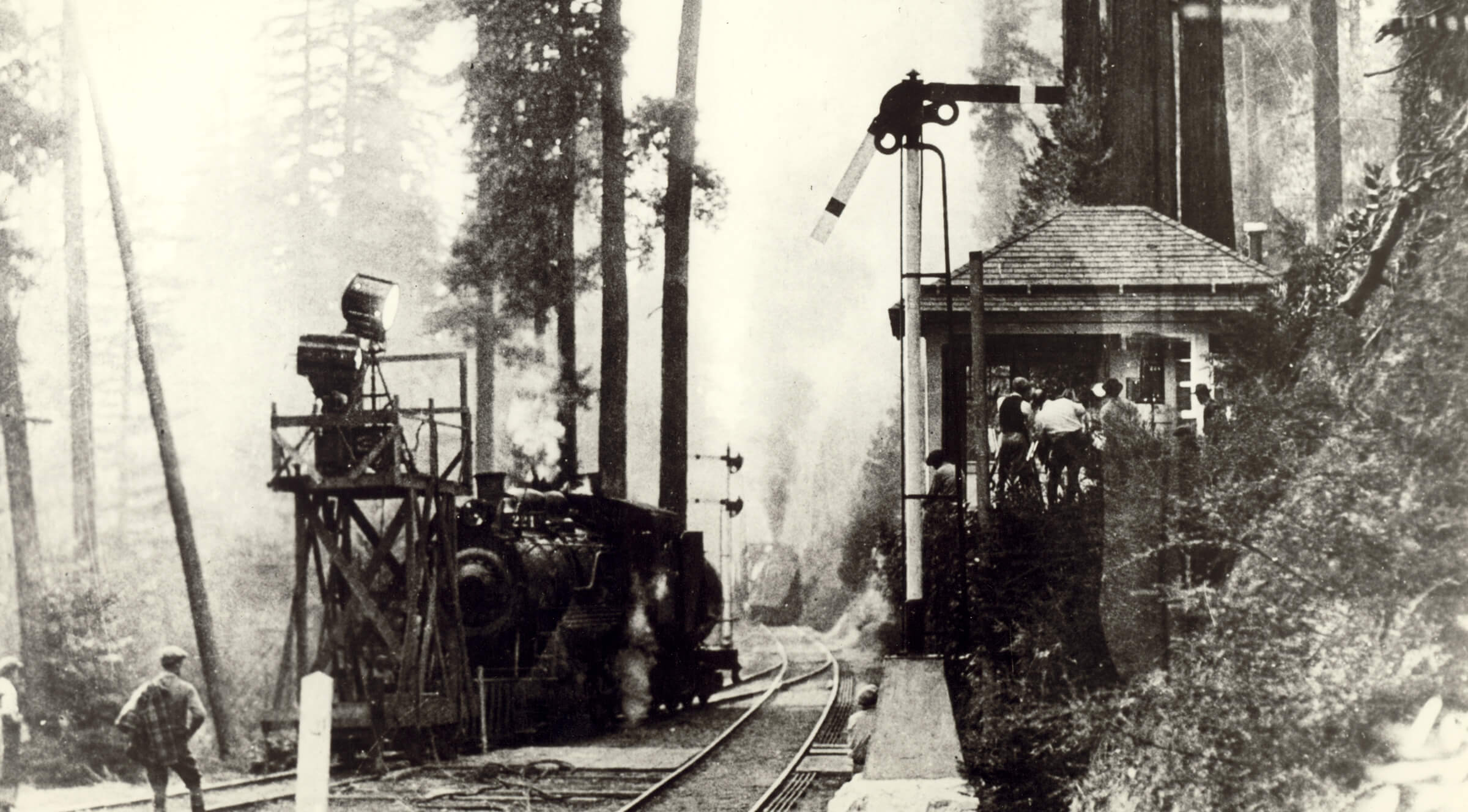This historical reprint was published in conjunction with the screening of The Signal Tower at SFSFF 2019
Northspur, Mendocino County, California
1924 letter sent to Picture-Play magazine
Dear Myrtle:
Well, I guess I’m “farthest North,” as they say in books; just about as deep into the wilds of Northern California as any picture player has ever ventured. It’s beautiful; great redwoods, the bluest sky I have ever seen and brown and yellow maple leaves lending a dash of color to the deep green of the firs. It’s so beautiful it’s actually awe-inspiring.
You’ll see all this when The Signal Tower is released. We have put in three weeks up here on a little stream called the Noyo River; three weeks filled with fun, a little excitement —and even a little tragedy.
I’m playing a placid housewife with a small son and a hard-working railroad-man husband —Rockcliffe Fellowes plays that part, with Frankie Darro as the little boy. Wallace Beery plays the “other man,” and Clarence Brown is the director. Mrs. Brown [Ona Wilson] came up with us —and that makes it nice; a sort of feminine point of contact with a director in a camp where the lack of many conveniences and little refinements might pave the way to many little misunderstandings ordinarily.
But we’re just a great big family up here. We all sit around after supper with all sorts of little pastimes that would sound foolish back in Hollywood —a sort of short-and-simple-annals-of-the-poor existence, as it were.
A few days ago I had a little time off and explored the country. There was an old abandoned estate; once a beautiful place, and it seems from countryside legend that the owner wandered off one day after breakfast and never came back. Left a charming house, beautifully furnished, stables, dairy, and all. The natives are rather reticent about it. We passed two evenings speculating on it and inventing romances to fit the strange happening.
Wallace Beery suggested that maybe the man was disappointed in love and went to Mexico or Canada or some place like that to drown his sorrow. Or else he might have fallen over a cliff, like a serial star. Mr. Brown said that maybe the poor man was blackmailed and fled. Dot Farley thought maybe he was an Eastern criminal who came out into the great open places to try and go straight —and then found out that a detective was on his trail. We all wondered. We’ve never been able to get the inside information on it. Charlie Dorian, the assistant director, said that maybe the daughter won a beauty contest —and the family moved to Hollywood to get into pictures!
We had an awful lot of excitement when a hand car was wrecked and Wallace Beery and Charlie Dorian were hurt. Poor Charlie was quite seriously injured. He’ll walk with a cane for months. Mr. Beery got off very easily. When the rest of the company picked them up he felt himself all over. I was rubbing his head and Dot Farley holding his hand. Then he grinned. “Gosh, if we only had the publicity man here to tell me where I’m hurt,” he said.
The little country hotel we stay at isn’t bad at all —except that the principal article of diet is steak. They’re always out of everything else and steak is the old stand-by. Mr. Beery says he’s going to be ashamed to look a cow in the eye when he gets back to Hollywood. But he has a good appetite, even if he does kick about the steak. The other day he complained that he was so tired of steak he’d lost his appetite. “Lost your appetite, have you?” asked Mr. Brown. “I saw the steak you had for breakfast —and if they’d left horns on it they could have milked it!”
I met a most interesting character here, a man who has hidden himself away in the woods, with only dogs for companions. Several of us had dinner in his camp —he cooked and served everything and wouldn’t allow anyone to help. It wouldn’t be fair to mention his name, as he is really very famous here and on the Continent. I held my breath while he told of the wonderful places he’d been: Port Said, Hongkong, Guatemala, queer unheard-of islands on the Pacific Ocean, names I can’t even pronounce. He’s studying nature, he says, and he certainly knows wonderful things about plants, birds and animals.
The children of the ranchers are awfully interested —and interesting. They crowd around and watch us whenever we come into the hotel, and once in a while one will pick up the courage to come to us and ask questions. They wanted to know what the reflectors were for, and how the camera worked, and whether we liked it in Fort Bragg, and what not. I grew to be awfully fond of one little girl. Strangely enough, no mothers appeared to try and get their children into the movies. They haven’t reached that lamentable stage up here in the country and still think more of sending their children to school than capitalizing them in front of a camera.
I ought to be back in a week or so—I’ll phone you the minute I get in, and we’ll have luncheon together and I’ll tell you lots more.

